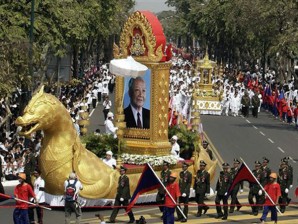
Thousands of mourners accompanied a gilded chariot carrying the body of former King Norodom Sihanouk — the dominant figure of modern Cambodia — in a funeral procession Friday to a cremation ground next to the palace where he was crowned more than 70 years ago.
PHNOM PENH, Cambodia—Thousands of mourners accompanied a gilded chariot carrying the body of former King Norodom Sihanouk — the dominant figure of modern Cambodia — in a funeral procession Friday to a cremation ground next to the palace where he was crowned more than 70 years ago.
His body had been lying in state at the Royal Palace after being flown from Beijing where he died Oct. 15 of a heart attack at the age of 89. The cremation, the climax of seven days of mourning, will take place Monday.
Many wept as the kilometer-long (0.6-mile) procession slowly proceeded, watched by more than half a million people, according to a preliminary estimate by city spokesman Long Dimanche. Reflecting the respect Sihanouk still commands in Cambodia, especially among the older generation, most knelt and clasped their hands in prayer as the cortege passed while Buddhist monks chanted.
“Since I was born, I have seen him doing everything for the country and people,” said Un Veth, 74, “Today is the last day. In the future I can only see him in photographs.”
Chan Virak, a 24-year-old student called the former king, “a great leader, the symbol of peace and prosperity for Cambodia.”
In a turbulent lifetime, Sihanouk wrested independence from the French colonials and managed to initially keep his small country out the Vietnam War by adroitly playing off the United States against the Communist world. But a 1970 coup engulfed Cambodia in the conflict and precipitated the Khmer Rouge reign of terror.
A consummate survivor and political opportunist, Sihanouk was imprisoned by the Khmer Rouge, and after their fall in 1979 went on to lead an insurgency against the Vietnamese-installed government in Cambodia. After a peace deal he helped broker, Sihanouk returned to Phnom Penh but abdicated in 2004 in favor of his son King Norodom Sihamoni, a ballet dancer educated in Europe who by all accounts ascended the throne reluctantly.
Sihamoni and his mother, Norodom Monineath, followed the seven-foot-high casket with Sihanouk’s body as it was moved from the palace past a line of be-medalled officials. The former queen wept quietly.
The casket was laid beneath a temple-like structure on one of several funeral chariots and accompanied by court Brahmins and women dressed as Apsaras, the celestial dancers of Cambodian mythology. Marching with the procession were courtiers dressed in pantaloons and spiked helmets, bearing five-tiered umbrellas and other royal regalia.